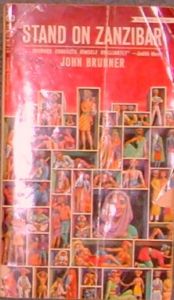Stand on Zanzibar (1968) 650 pages by John Brunner.
I started this book at the wrong time, right at the start of softball season, and I was working on my website, etc. The gist being that I needed to be able to concentrate and focus on the book, and read x pages per day. Instead I read 20 pages and left it for three weeks. Once I got past those first 30 or 40 pages, I got to see main storyline unfolding. At first I thought there was no main story it was going to be short snippets.
The book had four types of chapters, context, the happening world, tracking with closeups and continuity. The main storyline was in continuity, but that had two main characters Norman and Donald, so it wasn't until the the third or fourth continuity chapter that we got to see the same character a second time. So I will suggest that you set aside time to read at least 50 pages when you start this book.
In the world Brunner has set up, there are almost universal laws about becoming a parent. Some couples are denied licenses because of hereditary factors, no one is allowed to have more than two, etc. The tracking with closeups chapters focus on a different person or couple until it hits the halfway point of the book. There's a couple who wants to have a baby but are denied, there's a couple with three children facing prejudice and resentment, a draftee, an eptified soldier who has been discharged after being injured, and more.
The context sections kind of give an overview of the world. Bruner creates the nations of Yatakang and Beninia. The former being a world power of the likes of Russia, China, the US, and the European countries, the latter a third world country more impoverished than it's African neighbors.
The continuity section as I said follows Norman and Donald. Norman is a VP in the GT corporation. His story follows GT's involvement in trying to develop Beninia into a producing nation. The Beninians get schools, medical care, etc. GT gets a labor force and a market for it's MAMP raw materials. Donald's storyline head him toward Yatakang.
The happening world sections are snippets from headlines, or whatever and usually about 2 or 3 pages.
Brunner gives a slightly different feel to the book with slight changes in the language. Using prodgies instead of children, buckadingdongs instead of dollars, anti-matter and poppa-momma for am and pm.
When I finally got down to it and started reading, the book went pretty fast. I wouldn't have pegged it for winning a Hugo. Still it was good. Stand on Zanzibar (1968) 650 pages by John Brunner.
I started this book at the wrong time, right at the start of softball season, and I was working on my website, etc. The gist being that I needed to be able to concentrate and focus on the book, and read x pages per day. Instead I read 20 pages and left it for three weeks. Once I got past those first 30 or 40 pages, I got to see main storyline unfolding. At first I thought there was no main story it was going to be short snippets.
The book had four types of chapters, context, the happening world, tracking with closeups and continuity. The main storyline was in continuity, but that had two main characters Norman and Donald, so it wasn't until the the third or fourth continuity chapter that we got to see the same character a second time. So I will suggest that you set aside time to read at least 50 pages when you start this book.
In the world Brunner has set up, there are almost universal laws about becoming a parent. Some couples are denied licenses because of hereditary factors, no one is allowed to have more than two, etc. The tracking with closeups chapters focus on a different person or couple until it hits the halfway point of the book. There's a couple who wants to have a baby but are denied, there's a couple with three children facing prejudice and resentment, a draftee, an eptified soldier who has been discharged after being injured, and more.
The context sections kind of give an overview of the world. Bruner creates the nations of Yatakang and Beninia. The former being a world power of the likes of Russia, China, the US, and the European countries, the latter a third world country more impoverished than it's African neighbors.
The continuity section as I said follows Norman and Donald. Norman is a VP in the GT corporation. His story follows GT's involvement in trying to develop Beninia into a producing nation. The Beninians get schools, medical care, etc. GT gets a labor force and a market for it's MAMP raw materials. Donald's storyline head him toward Yatakang.
The happening world sections are snippets from headlines, or whatever and usually about 2 or 3 pages.
Brunner gives a slightly different feel to the book with slight changes in the language. Using prodgies instead of children, buckadingdongs instead of dollars, anti-matter and poppa-momma for am and pm.
When I finally got down to it and started reading, the book went pretty fast. I wouldn't have pegged it for winning a Hugo. Still it was good.
